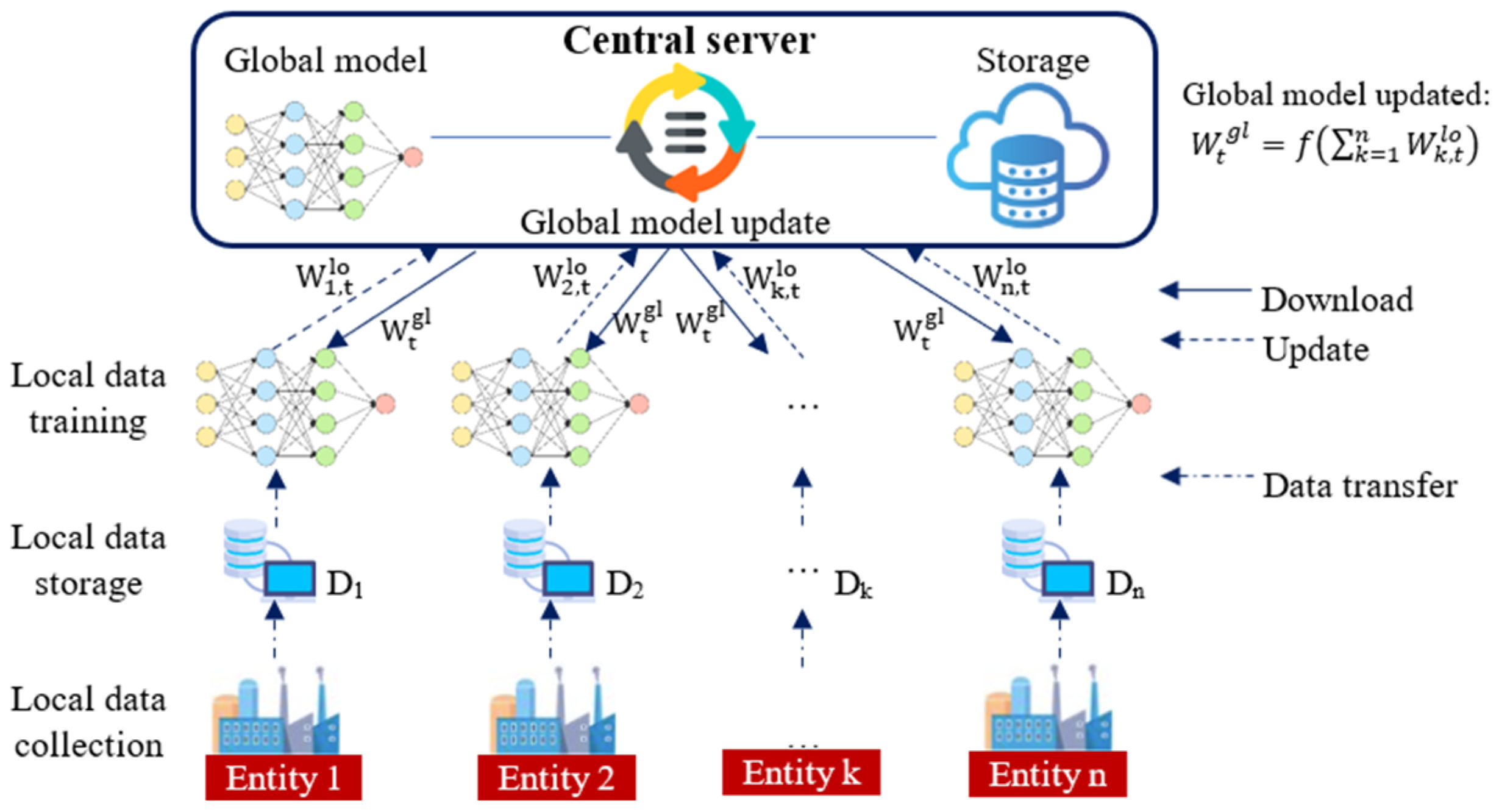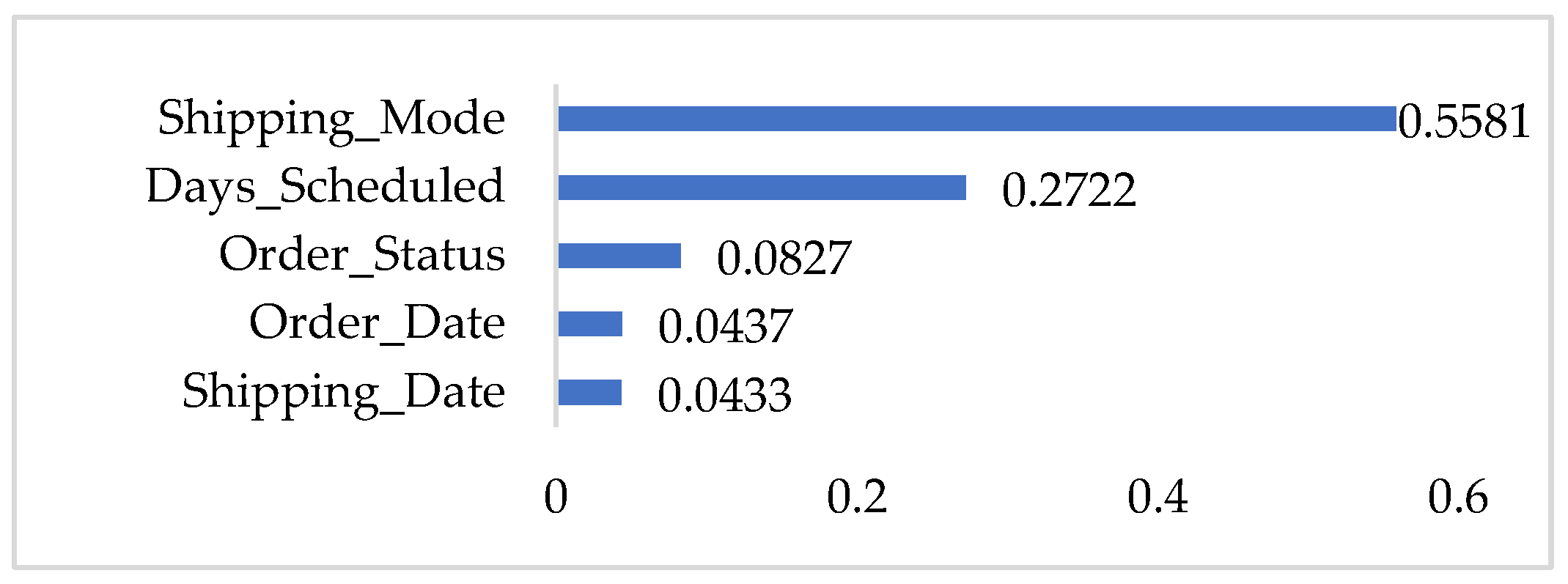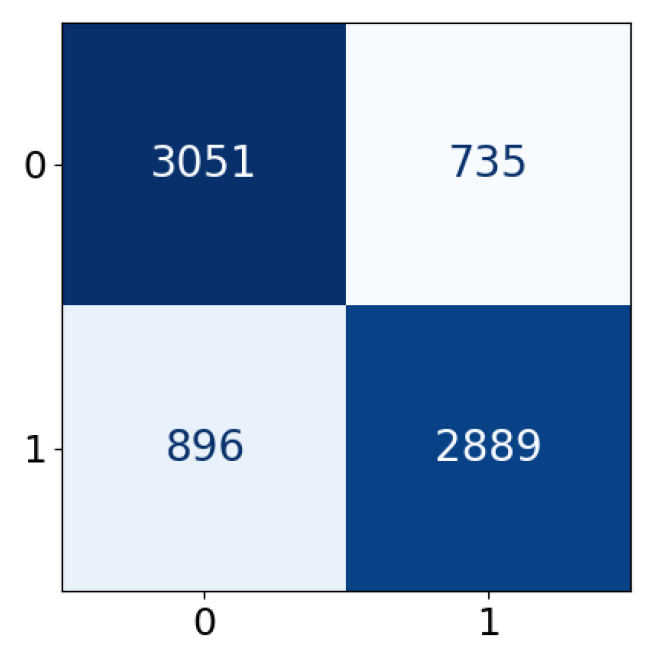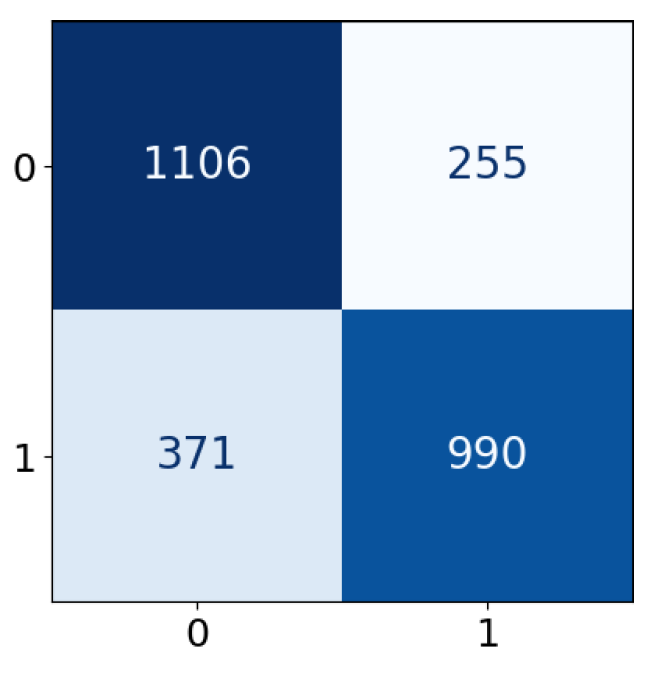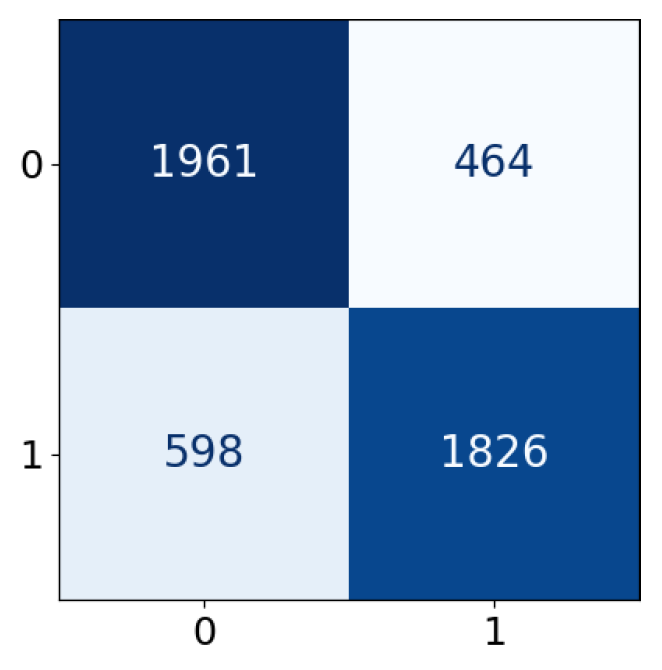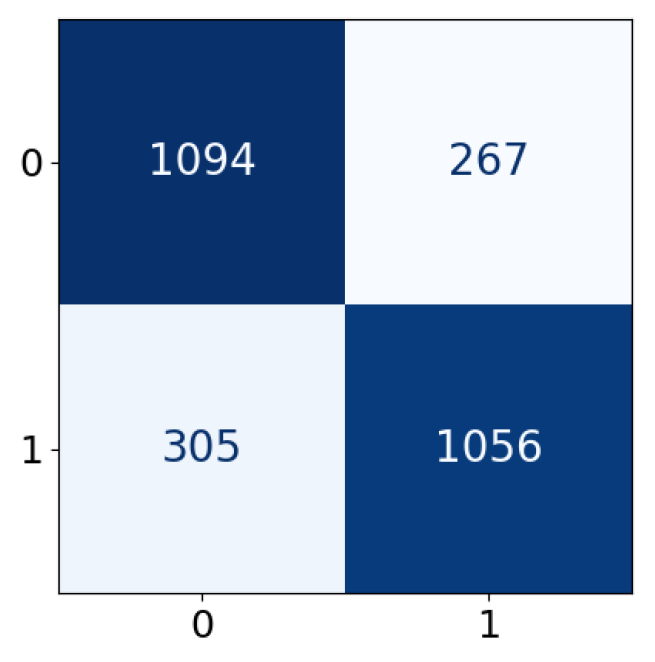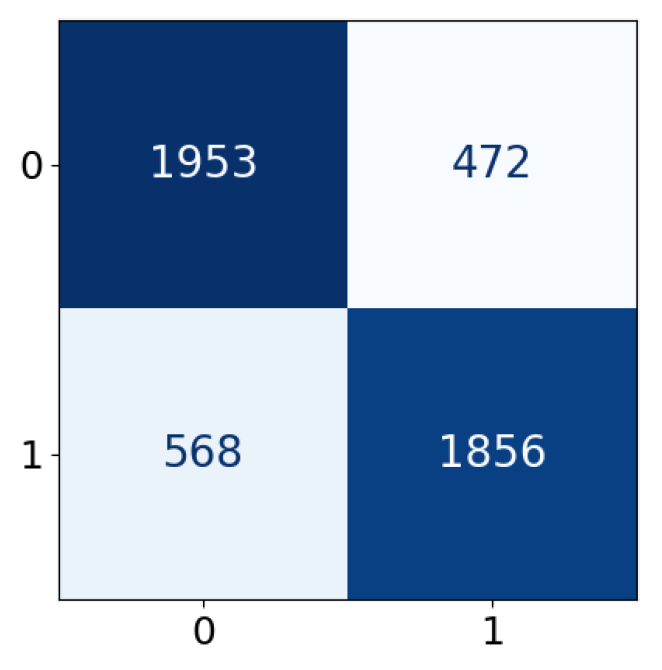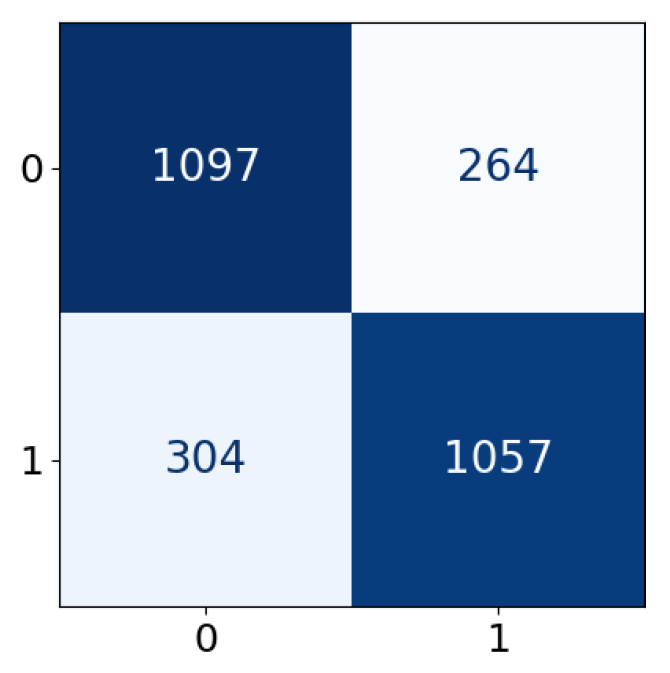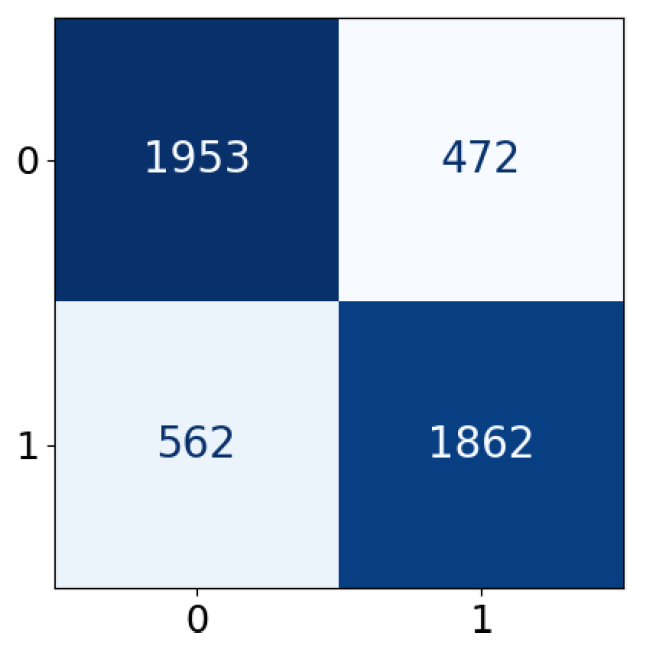Abstract
This paper proposes federated learning-based frameworks for supply chain risk management to address data-sharing constraints. To validate, centralized federated learning with horizontal data was applied for delivery delay prediction using datasets from two textile suppliers: supplier 1 has less data and is considered small, while supplier 2, with more data, represents a larger one. The prediction model is developed using an artificial neural network within the federated framework. The results show that federated learning benefits suppliers, especially the ones with limited data. Notably, federated learning outperforms centralized learning and local standalone learning. This highlights its potential to address privacy and facilitate collaboration.
1. Introduction
In the past decade, disruptions have profoundly affected industries worldwide, including global supply chains (SCs). As global trade grows and logistics networks become more complex, risks and uncertainties rise [1]. The SC disruption has become the most concerning topic in academia and industries, even after the COVID-19 pandemic. In SCs, disruptive threats can be divided into two categories: external risks, which originate from natural events, political conditions, competitors, and market fluctuations, and internal risks, which are tied to capacity, information systems, and internal operations [2]. Addressing these challenges adds complexity to managing risks effectively within SCs; however, it is vital to all participants.
Particularly, disruptions can cause delays. For suppliers, delivering products late compared to the designated date on the contract may result in contract violations and harm their reputation, especially if delays occur repeatedly. On the customer side, receiving products late can lead to sales losses or decreased satisfaction with the supplier. Considered low-impact but high-frequency events, delivery delays lasting up to two weeks may cause a sales reduction of as much as 10% within 3–4 weeks [3]. Especially in industries characterized by short product life cycles, high volatility, low predictability, and high-impulse purchasing, such as textiles and fashion, the need to address SC risks efficiently and promote SC resilience presents heightened challenges for SC risk management (SCRM) [4]. Due to the perishable nature of fashion products and the unpredictability of their demand, it is vital to maintain a responsive SC to swiftly deliver the products to the stores as needed [5]. To mitigate the risk of disruption, proactive strategies can help. Hence, anticipating potential delivery delays plays a critical role for SC stakeholders in improving production, inventory planning, and supporting what-if scenario execution [6].
SCRM is crucial for business continuity in the 4.0 Industry, where digital technologies have emerged as promising tools for enhancing SC management. As global SCs grow more complex, more advanced and collaborative approaches involving stakeholders are essential [7]. The traditional machine learning (ML) models require large, centralized datasets. However, the centralized ML approaches have proven inadequate in overcoming the challenges of privacy concerns and data isolation issues [8]. These limitations have led to the emergence of federated learning (FL) as a viable alternative. While FL has been widely applied in various domains, its application in SC management remains scarce [7,9,10].
Hence, this paper proposes FL frameworks aimed at enhancing SCRM, specifically addressing two key research questions: RQ1: How can FL enhance risk management in a SC? And RQ2: In which SC contexts can the FL method be applicable?
The remainder of the paper is structured as follows: Section 2 reviews the background and related works, exploring SCRM within the Industry 4.0 context and its challenges. Section 3 presents the proposed FL frameworks. Section 4 describes an experiment predicting delivery risks in the textile industry using centralized federated learning. Section 5 concludes the paper, summarizing the findings and limitations and suggesting future research directions.
2. Background and Related Works
Industry 4.0 highlights the challenges posed by increasing complexity, data privacy concerns, and the need for advanced technologies to enhance resilience. The field of SCRM focuses on risk management techniques designed for identifying, assessing, mitigating, and monitoring risks within the SC [11]. These risks can stem from microscopic and macroscopic sources. The goal of SCRM is to build a resilient SC that can adapt to changes and disruptions while minimizing adverse impacts on business operations. Since the COVID-19 outbreak, SC disruption has gained considerable attention, making its prediction important for SC stability. In the context of Industry 4.0, digital technology has increasingly emerged as a powerful tool for enhancing the effectiveness and efficiency of SCRM. The ability of artificial intelligence and ML to process massive datasets, uncover patterns, and predict future outcomes with exceptional accuracy makes them a compelling option [12]. Moreover, using digital technologies helps companies manage risks in their SC better, which then significantly affects corporate circular economy capability [13]. ML enables organizations to identify high-risk suppliers and predict delays, allowing them to take proactive strategies to mitigate the impact of disruptions, enhance resilience, and improve SC efficiency [14]. Within SCRM, data sharing aims to enable learning from past disruption events and supports the assessment of risks shared by all parties [4,7]. Unfortunately, most of the existing studies on information sharing concentrate on the benefits of shared data, assuming that institutions are willing to share, while neglecting the influence of their willingness to share [15]. Furthermore, conventional AI and ML models require centralized data, posing risks of organizational exposure and opportunistic use [7].
In an Industry 4.0 context, advancements in modern information and communication technology have greatly facilitated the generation, collection, and processing of personal data for various purposes, raising significant privacy concerns [16]. Two major challenges in data science development are data governance and data silos, where data governance holds the greatest importance [17]. Data governance laws, such as the General Data Protection Regulation (GDPR), which has been effective since 25 May 2018, grant users full ownership of their data, prohibiting its use without their consent. Similarly, the California Consumer Privacy Act (CCPA) has set high privacy standards, influencing global data protection and reshaping how organizations manage personal data. As a result, stakeholders in SCs may encounter legal challenges related to data sharing when collaborating in SCRM. The other major challenge, that of data silos, where data are isolated within systems, departments, or organizations, hinders industry development by limiting access to larger datasets that are essential for improving ML model performance. These challenges are directly related to data sharing and collaboration along the SC. Collaboration among SC members enhances resilience to disruptions through shared information, aligned targets, integrated decisions, efficient communication, resource sharing, creativity, and incentive alignments, ensuring a unified and adaptive response to disruptions [18]. Data sharing has long been recognized as a critical mechanism for mitigating undesirable effects such as the Bullwhip effect and shortage gaming, but the field of SC management has long struggled with this issue [10], as concerns about confidentiality remain a significant barrier [7].
FL is a promising new approach that aids in developing privacy-preserving systems and secure distributed learning models. Since 2022, FL has gained popularity in SCRM [6]. Ref. [10] proposed centralized federated learning (CFL) for SC risk prediction, ensuring data privacy from three buyers in the UK maritime sector. Ref. [9] suggested a CFL framework for order-level risk prediction in aerospace, while [19] applied CFL for credit card fraud detection. Ref. [10] also developed an adaptive FL approach to predict delivery delays in e-commerce SCs. However, the application of FL in SC management is still scarce [7,9].
3. Federated Learning and Taxonomy
FL, postulated by Google in 2016, is a learning technique that enables collaborative learning from decentralized data while maintaining data privacy by avoiding central storage [20]. The process of FL has three basic steps as follows: (i) each entity locally trains a model on its own dataset; (ii) each entity sends its updated model to a designated aggregation point; and (iii) the aggregation point combines the received model updates to form the global model. Today, FL is the leading framework for collaboratively training ML models while maintaining privacy constraints [21]. In SCRM, FL can offer several advantages, such as (i) decentralized training without sharing raw data, reducing data storage complexities; (ii) enhanced privacy; (iii) cost reductions; (iv) lower latency; (v) reduced power consumption; and (vi) collaborative organizational action [6]. The following sessions explain the main FL types.
3.1. Centralized Federated Learning
CFL is the conventional form of FL, where a central server aggregates local models from all entities to form a global model. The framework of CFL is illustrated in Figure 1, where represents the data owners, each with their respective dataset . The CFL process begins with (i) the initialization of the global model weights () in the central server, and sends the global model to each entity. Next, (ii) each entity trains its model locally without exposing its data to others, followed by (iii) sending the updates (, , …, ) to a central server. (iv) The server aggregates these updates into a global model and (v) sends it back to the entities. Finally, (vi) each entity incorporates the global update into its local model. During the FL process, FedAvg (Federated Averaging) is known as a popular and effective aggregation algorithm that combines local models through parameter-wise averaging [22]. This aggregation method uses Unweighted FedAvg, given by and Weighted FedAvg, expressed as , where N represents the total number of entities, and denotes the number of data points used by entity i. Unweighted FedAvg treats all entities equally during model aggregation, regardless of the size of their local datasets. In contrast, Weighted FedAvg adjusts each entity’s contribution based on the size of their dataset, giving more influence to the entities with larger datasets.
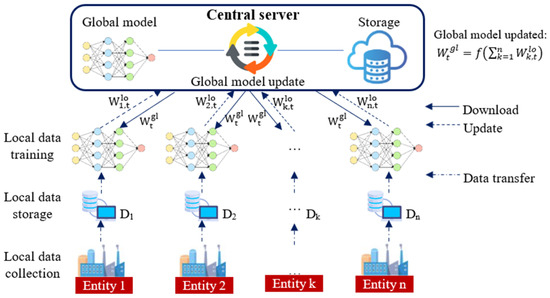
Figure 1.
Centralized federated learning framework.
FL is still emerging, with most applications using the widely adopted CFL architecture [22]. CFL is easier to implement in the SC and works well in the context that SC partners trust a central server for aggregation. CFL has attracted considerable attention from both academia and industry [23].
3.2. Decentralized Federated Learning
While CFL has been widely used, it has limitations, such as communication bottlenecks and central server reliance. Decentralized FL (DFL), introduced in 2018, tackles these challenges by facilitating decentralized model aggregation and minimizing reliance on a central server [22]. Generally, DFL operates as follows: (i) entities begin by initializing their local models independently; (ii) they then train these models locally using their own datasets; (iii) next, entities directly exchange model parameters with other ones via peer-to-peer (P2P) communication; and (iv) finally, they refine their local models by aggregating the received parameters from their peers. DFL becomes more feasible in the context that stakeholders prefer direct P2P collaboration rather than relying on a central server.
3.3. Semi-Centralized Federated Learning
As CFL often imposes significant computational demands on the server, while DFL incurs substantial P2P communication costs [24], semi-centralized FL (SCFL) was introduced as a hybrid model, aiming to balance the benefits and drawbacks of both centralized and decentralized approaches, optimizing collaboration while maintaining data privacy. In SCFL, entities locally train models on their own datasets and update their models to sub-servers (agents) using the CFL approach, while the global model is aggregated through DFL among sub-servers. The SCFL methods can be categorized into (i) clustered FL and (ii) hierarchical FL [24]. In clustered FL, data owners are grouped into clusters to obtain the global model, while in hierarchical FL, local models are trained by data nodes, aggregated by intermediate nodes, and then further aggregated to form the final federated model.
3.4. Semi-Decentralized Federated Learning
In contrast to CFL, DFL, and SCFL, a hybrid architecture that combines aspects of both CFL and DFL, where local models use DFL—but the role of the aggregator for forming the global model rotates randomly among participants at each round of the learning process to eliminate potential single points of failure and improve overall system resilience—is called semi-decentralized FL (SDFL). SDFL is a cost-effective solution for larger networks, providing comparable performance to DFL while requiring fewer resources [22]. Both SCFL and SDFL may be ideal for a complex SC that involves multiple regional hubs (across different geographical regions) or sectors (encompassing different parts of the SC, such as sourcing, manufacturing, logistics, etc.).
3.5. Data in FL
FL can be categorized into three types based on data distribution: horizontal FL (HFL), vertical FL (VFL), and federated transfer learning (FTL) [25]. The FL comprehensive training dataset is represented as (X, Y, I), where X is the feature space, Y is the label space, and I is the sample identity space. Accordingly, HFL applies to datasets where ; VFL applies to datasets where ; and FTL applies when .
4. An Experiment: Predicting the Delivery Risk in the Textile Supply Chain
This study proposes FL-based frameworks for SCRM, addressing data privacy, decentralized data, and model training challenges. To validate FL’s application, we conducted an experiment using CFL to predict delivery delays for two textile suppliers.
4.1. Data Description
For the delivery delay prediction, the key features derived from [7,10] are used, as shown in Table 1. The datasets from Mendeley Data [26] include 12,487 observations for supplier 1 (S1) and 22,246 for supplier 2 (S2). The key features include “Scheduled_Days”, “Actual_Days”, “Order_Date”, “Shipping_Date”, “Order_Status”, and “Shipping_Mode”. Delivery risk (∆DR) is defined as the difference between “Actual_Days” and “Scheduled_Days”, and if ∆DR is positive, it means “Late”; otherwise, it means “On-time”. Label encoding is applied to categorical features such as “Order_Status” and “Shipping_Mode”. We normalized the data using min-max normalization, defined as: .

Table 1.
Features selected and description.
Table 2 presents the homogeneity test results for the two datasets used in prediction. The Kolmogorov–Smirnov (K-S) test is applied to the numeric features, while the Chi-Square test is used for the categorical features. The results indicate that “Scheduled_Days”, “Delivery_Risk”, “Order_Status”, and “Shipping_Mode” have similar distributions (p-value > 5%), while “Order_Date” and “Shipping_Date” differ significantly (p-value < 5%). In FL, data heterogeneity often leads to client drift, harming model performance [27].

Table 2.
Summarization of dataset homogeneity testing.
Figure 2 illustrates feature importance using XGBoost, showing that “Shipping_Mode” is the strongest predictor of “Delivery_Risk”, followed by “Scheduled_Days”, aligning with the findings from [10]. “Order_Status” and “Order_Date” follow in importance, while “Shipping_Date” has the least impact.
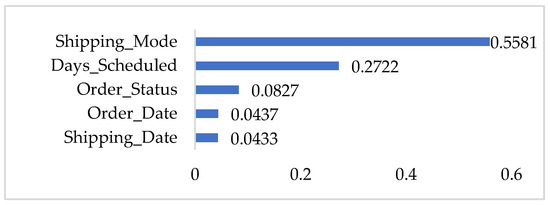
Figure 2.
Feature importance by XGBoost.
4.2. Model Setting and Performance Metrics
To train the model in FL, Artificial Neural Networks (ANNs), inspired by the human brain’s structure and function, are used. Today, the ANN has become more popular because of its ability to learn from data and deliver accurate predictions [28]. As shown in Table 3, the ANN model is designed for binary classification tasks and is built using the Keras Sequential API within a FL framework to collectively predict delivery risks. It comprises an input layer (32 neurons), two hidden layers (16 and 8 neurons with ReLU activation), and a Sigmoid output layer with one neuron for binary classification. The model trains for 100 epochs with a batch size of 32, learning risk patterns while preserving data privacy. The model is compiled with the Adam optimizer, a learning rate of 0.001, and binary cross-entropy as the loss function, while accuracy is used as the evaluation metric. To prevent overfitting, L2 regularization is applied to each layer, penalizing large weights [29]. Table 4 shows the algorithm for the CFL framework for the prediction. Additionally, to address the issue of imbalanced training data, the FL system incorporates the Synthetic Minority Over-sampling Technique (SMOTE), as emphasized in [30].

Table 3.
Parameters and architecture of the ANN model in the CFL framework.

Table 4.
CFL algorithm.
We evaluated the model performance using four metrics—accuracy, precision, recall, and the F1-score—from the confusion matrix (Table 5), defined as follows:; ; and .

Table 5.
Structure of the confusion matrix.
4.3. Results and Discussion
Table 6 presents the model’s performance metrics, highlighting that CFL outperforms other scenarios, including centralized learning (CL) and local standalone learning (LSL). Notably, CFL using unweighted federated averaging for global model aggregation achieves the best performance across all metrics. Compared to LSL, CL performs better; nonetheless, this scenario is not practical in real-world SCs. Additionally, S1, with less data, exhibits the lowest performance across all metrics, while S2, with more data, demonstrates better overall performance. Figure 3 illustrates the performance differences between LSL and CL, showing that the differences (LSL-CL) for S2 are consistently smaller than those for S1. This suggests that enterprises with fewer data, typically small and medium-sized ones (SMEs), tend to achieve more limited model training outcomes compared to larger enterprises, as emphasized by [7]. Importantly, the results reveal that S1 can significantly improve its prediction model, while S2 also experiences a performance increase when they participate in FL together. Compared to LSL for S1, CFL can, on average, improve accuracy by 0.0206, precision by 0.0189, recall by 0.0209, and the F1-score by 0.0210. Our study indicates that SMEs significantly benefit from FL, as concluded by [7,9]. Remarkably, however, this study shows that CFL outperforms CL, with the performance differences between CFL and CL being consistently positive (Figure 3).

Table 6.
Accuracy, precision, recall, and F1-score of LSL, CL, and CFL.

Figure 3.
Performance comparison across learning scenarios.
Figure 4, Figure 5, Figure 6, Figure 7, Figure 8, Figure 9 and Figure 10 present the confusion matrices for model classification, while Table 7 displays the classification report, including precision, recall, and the F1-score for each class (1: “Late”, 0: “On-time”) across two suppliers and three scenarios. The results show that CFL (both Weighted FedAvg and Unweighted FedAvg for global model updates) generally outperforms CL and LSL across the performance metrics and suppliers. This aligns with the findings of [31], which highlighted that FL delivers superior performance compared to CL. In this study, CFL provides a more balanced and consistent performance, highlighting its effectiveness in improving model accuracy. The F1-score for the “Late” class of S1 increases from 0.7598 with standalone training to 0.7869 and 0.7882 when participating in FL. Similarly, S2’s F1-score for the “Late” class rises from 0.7747 with its own data to 0.7811 and 0.7827 with FL participation. Interestingly, the performance difference between S1 and S2 is minimal for CFL, compared to LSL, highlighting how FL helps reduce data inequality and enhance prediction model performance while ensuring data privacy.
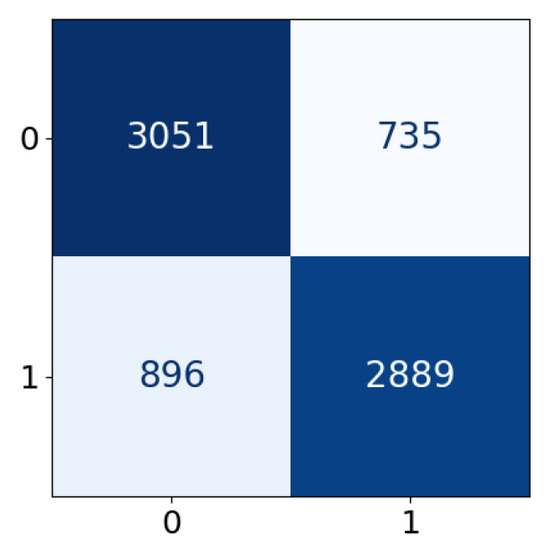
Figure 4.
CL.
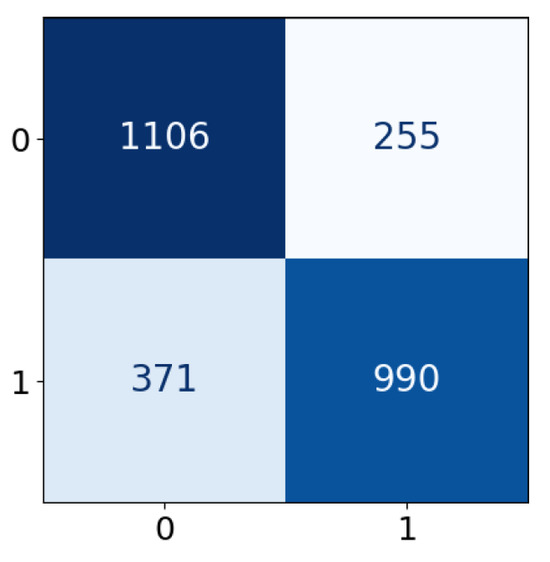
Figure 5.
S1: LSL.
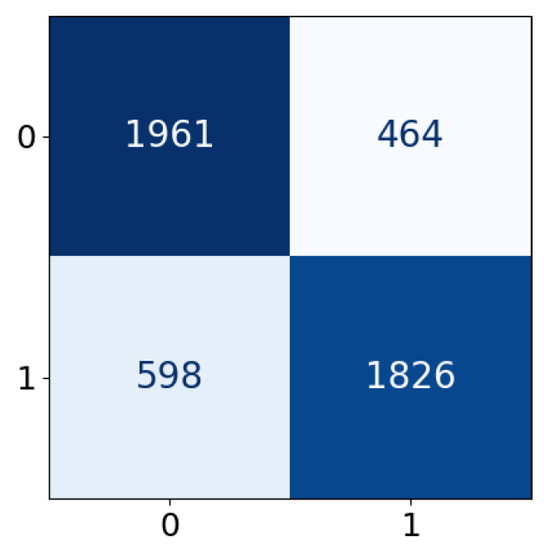
Figure 6.
S2: LSL.
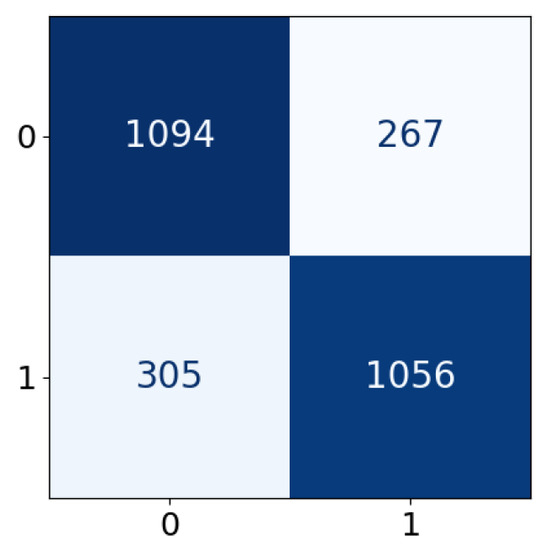
Figure 7.
S1: CFL weighted.
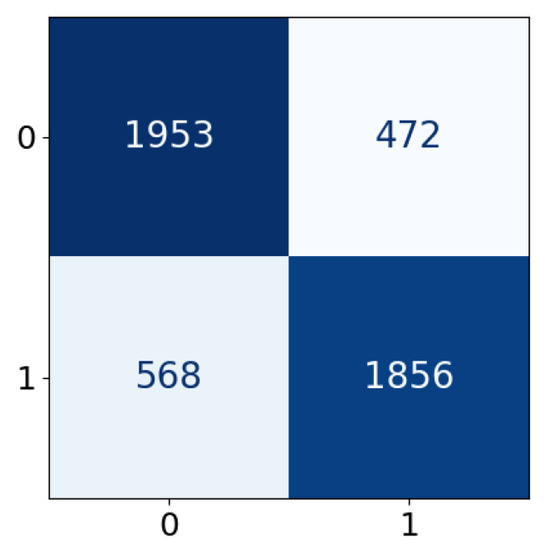
Figure 8.
S2: CFL weighted.
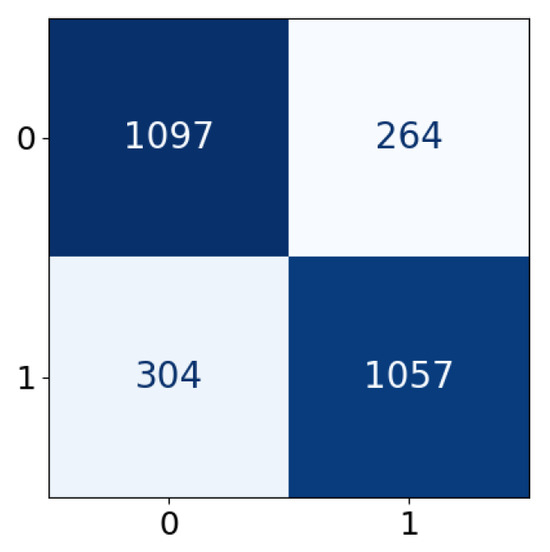
Figure 9.
S1: CFL unweighted.
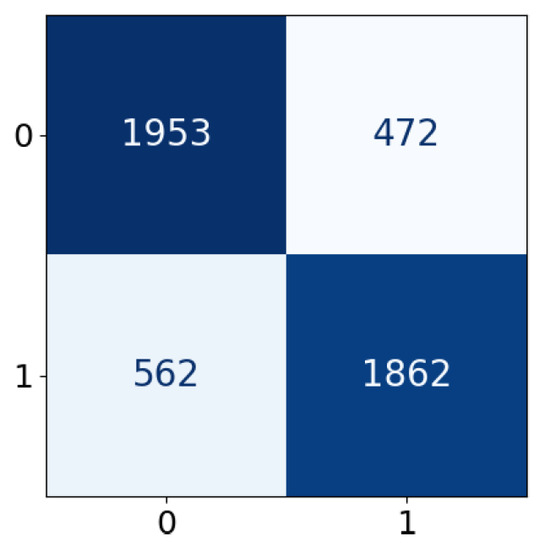
Figure 10.
S2: CFL unweighted.

Table 7.
Precision, recall, and the F1-score from LSL, CL, and CFL.
The delivery risk prediction model for suppliers S1 and S2 demonstrates steady improvement. Both training and validation accuracy gradually increase, stabilizing between 77.5% and 80% after 100 epochs. Similarly, the training and validation loss consistently decrease, reaching a plateau between 0.40 and 0.45 after approximately 60 epochs. The convergence and alignment of the accuracy and loss curves indicate the model’s reliability, generalization capability, and robustness.
5. Conclusions
This paper proposes FL-based frameworks for SCRM, addressing privacy concerns and data-sharing constraints in Industry 4.0 SCs. We validated the framework using CFL with horizontal data to predict delivery delays in the textile industry, leveraging datasets from two suppliers of varying sizes. The results from the ANN model within the CFL framework show that FL provides advantages for two suppliers, especially for suppliers with limited data, reducing data inequality. Notably, our study reveals that CFL outperforms CL and LSL, demonstrating its feasibility as a privacy-preserving alternative compared to traditional learning methods. This confirms FL is a promising approach for enhancing risk management through knowledge sharing, collaboration, and fostering SC resilience.
Limitations and Further Study
The choice of ML algorithm in FL affects prediction performance, and future research should explore various algorithms. While FedAvg is simple, it may not suit all participants with differing data distributions, highlighting the need for personalized FL. Moreover, in Industry 4.0, integrating Blockchain, Internet of Things (IoT), and FL provides a new avenue for enhancing SC collaboration, thus boosting efficiency, transparency, and resilience. Additionally, understanding barriers and enablers is crucial for successful FL adoption and requires further exploration.
Author Contributions
Conceptualization, T.T.N.; methodology, T.T.N., A.B., and T.M.L.; validation, A.B., and T.M.L.; formal analysis, T.T.N.; writing—original draft preparation, T.T.N., and T.C.; writing—review and editing, T.T.N., T.C., and A.S.; supervision, A.A., A.B., T.M.L. and T.T.H.T. All authors have read and agreed to the published version of the manuscript.
Funding
This research did not receive any external funding.
Institutional Review Board Statement
Not applicable.
Informed Consent Statement
Not applicable.
Data Availability Statement
The data used in this study are available from the corresponding author upon request.
Conflicts of Interest
The authors declare no conflicts of interest.
References
- Xu, Z.; Ni, W.; Liu, S.; Wang, F.; Li, J. Logistics Supply Chain Network Risk Prediction Model Based on Intelligent Random Forest Model. IEEE Trans. Eng. Manag. 2024, 71, 9813–9825. [Google Scholar] [CrossRef]
- Kumar, S.K.; Tiwari, M.K.; Babiceanu, R.F. Minimisation of supply chain cost with embedded risk using computational intelligence approaches. Int. J. Prod. Res. 2010, 48, 3717–3739. [Google Scholar] [CrossRef]
- Niemi, T.; Hameri, A.-P.; Kolesnyk, P.; Appelqvist, P. What is the value of delivering on time? JAMR 2020, 17, 473–503. [Google Scholar] [CrossRef]
- Chen, C.; Gu, T.; Cai, Y.; Yang, Y. Impact of supply chain information sharing on performance of fashion enterprises: An empirical study using SEM. J. Enterp. Inf. Manag. 2019, 32, 913–935. [Google Scholar] [CrossRef]
- Mehrjoo, M.; Pasek, Z.J. Risk assessment for the supply chain of fast fashion apparel industry: A system dynamics framework. Int. J. Prod. Res. 2016, 54, 28–48. [Google Scholar] [CrossRef]
- Nguyen, T.T.; Bekrar, A.; Le, T.M.; Artiba, A.; Chargui, T.; Trinh, T.T.H. Federated Machine Learning in Supply Chain Risk Management: Insights from A Review Using Systematic Method and Future Research Prospects. In Proceedings of the 2024 International Conference of the African Federation of Operational Research Societies (AFROS), Tlemcen, Algeria, 3–5 November 2024. [Google Scholar]
- Zheng, G.; Kong, L.; Brintrup, A. Federated machine learning for privacy preserving, collective supply chain risk prediction. Int. J. Prod. Res. 2023, 61, 8115–8132. [Google Scholar] [CrossRef]
- Arbaoui, M.; Brahmia, M.-A.; Rahmoun, A.; Zghal, M. Federated Learning Survey: A Multi-Level Taxonomy of Aggregation Techniques, Experimental Insights, and Future Frontiers. ACM Trans. Intell. Syst. Technol. 2024, 15, 1–69. [Google Scholar] [CrossRef]
- Kong, L.; Zheng, G.; Brintrup, A. A federated machine learning approach for order-level risk prediction in Supply Chain Financing. Int. J. Prod. Econ. 2024, 268, 109095. [Google Scholar] [CrossRef]
- Zheng, G.; Ivanov, D.; Brintrup, A. An adaptive federated learning system for information sharing in supply chains. Int. J. Prod. Res. 2024, 1–23. [Google Scholar] [CrossRef]
- Ho, W.; Zheng, T.; Yildiz, H.; Talluri, S. Supply chain risk management: A literature review. Int. J. Prod. Res. 2015, 53, 5031–5069. [Google Scholar] [CrossRef]
- Bouchetara, M.; Zerouti, M.; Zouambi, A.R. Leveraging Artificial In℡ligence (ai) in Public Sector Financial Risk Management: Innovations, Challenges, and Future Directions. EDPACS 2024, 69, 124–144. [Google Scholar] [CrossRef]
- Yuan, S.; Pan, X. The effects of digital technology application and supply chain management on corporate circular economy: A dynamic capability view. J. Environ. Manag. 2023, 341, 118082. [Google Scholar] [CrossRef]
- Rezki, N.; Mansouri, M. Machine Learning for Proactive Supply Chain Risk Management: Predicting Delays and Enhancing Operational Efficiency. Manag. Syst. Prod. Eng. 2024, 32, 345–356. [Google Scholar] [CrossRef]
- Du, T.C.; Lai, V.S.; Cheung, W.; Cui, X. Willingness to share information in a supply chain: A partnership-data-process perspective. Inf. Manag. 2012, 49, 89–98. [Google Scholar] [CrossRef]
- Haq, M.Z. How does the General Data Protection Regulation (GDPR) affect financial intelligence exchange with third countries? J. Money Laund. Control 2022, 27, 158–170. [Google Scholar] [CrossRef]
- Li, L.; Fan, Y.; Tse, M.; Lin, K.-Y. A review of applications in federated learning. Comput. Ind. Eng. 2020, 149, 106854. [Google Scholar] [CrossRef]
- Cao, M.; Zhang, Q. Supply chain collaborative advantage: A firm’s perspective. Int. J. Prod. Econ. 2010, 128, 358–367. [Google Scholar] [CrossRef]
- Yang, W.; Zhang, Y.; Ye, K.; Li, L.; Xu, C.-Z. FFD: A Federated Learning Based Method for Credit Card Fraud Detection. In Big Data—BigData 2019; Chen, K., Seshadri, S., Zhang, L.-J., Eds.; Springer International Publishing: Cham, Switzerland, 2019; pp. 18–32. [Google Scholar] [CrossRef]
- McMahan, B.; Moore, E.; Ramage, D.; Hampson, S.; Arcas, B.A.Y. Communication-Efficient Learning of Deep Networks from Decentralized Data. In Proceedings of the 20th International Conference on Artificial Intelligence and Statistics, PMLR, Fort Lauderdale, FL, USA, 20–22 April 2017; pp. 1273–1282. Available online: https://proceedings.mlr.press/v54/mcmahan17a.html (accessed on 6 January 2025).
- Sattler, F.; Müller, K.-R.; Samek, W. Clustered Federated Learning: Model-Agnostic Distributed Multitask Optimization Under Privacy Constraints. IEEE Trans. Neural Netw. Learn. Syst. 2021, 32, 3710–3722. [Google Scholar] [CrossRef]
- Medjadji, C.; Leduc, G.; Kubler, S.; Traon, Y.L. Centralized vs Decentralized Federated Learning: A trade-off performance analysis. In Proceedings of the 2024 11th International Conference on Future Internet of Things and Cloud (FiCloud), Vienna, Austria, 19–21 August 2024; pp. 69–76. [Google Scholar] [CrossRef]
- Li, T.; Sahu, A.K.; Talwalkar, A.; Smith, V. Federated Learning: Challenges, Methods, and Future Directions. IEEE Signal Process. Mag. 2020, 37, 50–60. [Google Scholar] [CrossRef]
- Liu, F.; Zheng, Z.; Shi, Y.; Tong, Y.; Zhang, Y. A survey on federated learning: A perspective from multi-party computation. Front. Comput. Sci. 2023, 18, 181336. [Google Scholar] [CrossRef]
- Yang, Q.; Liu, Y.; Chen, T.; Tong, Y. Federated Machine Learning: Concept and Applications. arXiv 2019, arXiv:1902.04885. [Google Scholar] [CrossRef]
- Constante, F.; Silva, F.; Pereira, A. DataCo Smart Supply Chain for Big Data Analysis. Mendeley Data 2019, 5. [Google Scholar] [CrossRef]
- Tang, Z.; Zhang, Y.; Shi, S.; He, X.; Han, B.; Chu, X. Virtual Homogeneity Learning: Defending against Data Heterogeneity in Federated Learning. arXiv 2022, arXiv:2206.02465. [Google Scholar] [CrossRef]
- Hudnurkar, M.; Renji, K.M.; Ambekar, S.; Sahu, G.; Joseph, K.M. Predicting Delays for Truck Delivery Logistics: An Application of AI and ML. In Proceedings of the 2024 Ninth International Conference on Science Technology Engineering and Mathematics (ICONSTEM), Chennai, India, 4–5 April 2024; pp. 1–10. [Google Scholar] [CrossRef]
- Albahr, A.; Albahar, M.; Thanoon, M.; Binsawad, M. Computational Learning Model for Prediction of Heart Disease Using Machine Learning Based on a New Regularizer. Comput. Intell. Neurosci. 2021, 2021, 8628335. [Google Scholar] [CrossRef]
- Shingi, G. A federated learning based approach for loan defaults prediction. In Proceedings of the 2020 International Conference on Data Mining Workshops (ICDMW), Sorrento, Italy, 17–20 November 2020; pp. 362–368. [Google Scholar] [CrossRef]
- Divya, M.; Jasmine, K.S. Comparative Study of Federated Learning Vs Centralized Learning. Grenze Int. J. Eng. Technol. 2024, 1004–1012. [Google Scholar]
Disclaimer/Publisher’s Note: The statements, opinions and data contained in all publications are solely those of the individual author(s) and contributor(s) and not of MDPI and/or the editor(s). MDPI and/or the editor(s) disclaim responsibility for any injury to people or property resulting from any ideas, methods, instructions or products referred to in the content. |
© 2025 by the authors. Licensee MDPI, Basel, Switzerland. This article is an open access article distributed under the terms and conditions of the Creative Commons Attribution (CC BY) license (https://creativecommons.org/licenses/by/4.0/).

